Understanding the Link Between Asthma and Oral Health in Children
Impact of Asthma and Inhaled Medications on Oral Health
Children with asthma often use inhalers and medications like bronchodilators and corticosteroids, which can lead to dry mouth. This reduction in saliva flow increases the growth of cavity-causing bacteria and yeast in the mouth. Some inhalers have low pH and added sugars, further contributing to the risk of tooth decay.
Common Oral Health Challenges Faced by Children with Asthma
Due to these medication effects and mouth breathing often associated with asthma, children are more prone to dental issues such as cavities, gum disease, and oral thrush (a white rash inside the mouth caused by fungal infection). Inhaled steroids can also irritate the throat and gums, leading to higher rates of gingivitis. Additionally, physical traits like a high palate and malocclusion are sometimes seen.
Importance of Saliva and Dry Mouth Effects
Saliva plays a critical role in protecting teeth by washing away bacteria and neutralizing acids. Asthma's medication-induced dry mouth reduces this natural defense, accelerating plaque and tartar buildup. Staying well-hydrated and rinsing the mouth after inhaler use are practical steps that help maintain saliva balance and oral health.
Managing Dry Mouth and Preventing Cavities in Asthmatic Children
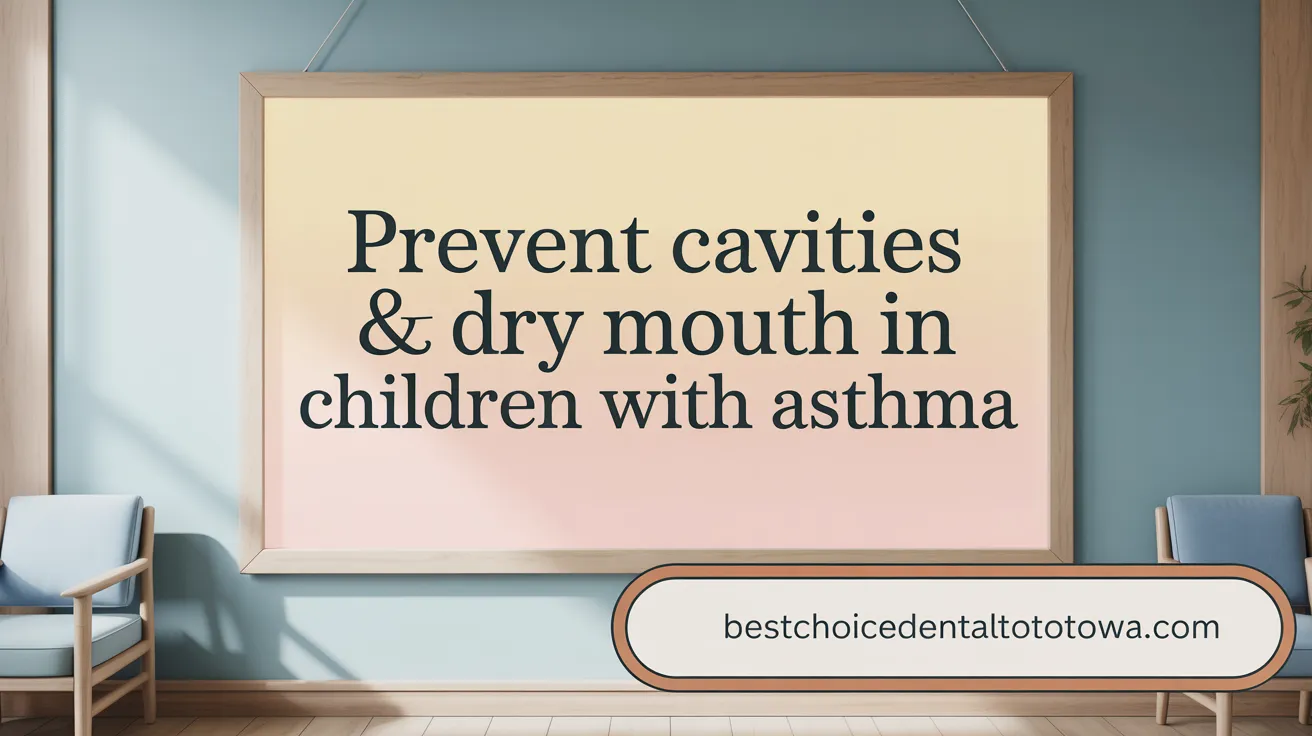
How asthma medications contribute to dry mouth
Many asthma medications, including bronchodilators and inhaled corticosteroids, reduce saliva production in children. This dryness occurs because these drugs can cause mouth breathing and irritate oral tissues, diminishing the flow of saliva that naturally cleanses the mouth (Asthma medications and oral health, Impact of bronchodilators on dry mouth and cavities).
Role of saliva in oral health protection
Saliva is essential for maintaining oral health. It helps neutralize acids, wash away food particles and bacteria, and supply minerals that protect and repair tooth enamel. When saliva flow declines, children become more susceptible to plaque buildup, cavities, and gum disease (Importance of saliva in oral health, Managing oral health with asthma).
Strategies to mitigate dry mouth and reduce cavity risk
To combat dry mouth, rinsing the mouth with water immediately after using inhalers is highly recommended. Using spacers with inhalers can also minimize medication residue in the mouth. Drinking plenty of water throughout the day supports hydration and saliva production. Gentle brushing with a soft-bristled toothbrush and daily flossing maintain oral hygiene without irritating sensitive gums (Rinsing mouth after inhaler use, Using spacers with inhalers, Dental hygiene tips for asthmatic children).
Use of fluoride toothpaste and fluoride varnishes
Brushing twice daily with fluoride toothpaste approved by dental associations is crucial. Fluoride strengthens enamel and makes teeth more resistant to decay. Additionally, professional fluoride varnish applications during dental visits add an extra protective layer, particularly beneficial for children using inhalers (Fluoride treatments for asthmatic children, Fluoride varnish application benefits, Using fluoride toothpaste for cavity prevention.
Dietary recommendations to reduce sugars and acids
Limiting sugary and acidic foods and beverages, such as candies, sodas, and juices, helps lower acid production in the mouth. Offering tooth-friendly foods like vegetables, nuts, and dairy supports oral health (Diet and cavity prevention in asthmatic children, Limiting sugar for dental health, Tooth-friendly foods for asthma patients).
How does Best Choice Dental ensure its services are modern and up-to-date?
Best Choice Dental integrates cutting-edge dental technology, including digital oral health assessments and fluoride varnish treatments, to provide personalized care tailored to children with asthma. Their team remains well-informed on the latest advances in managing dry mouth and cavity prevention, ensuring every patient receives effective and compassionate care aligned with current best practices (Preventive dental care recommendations for asthmatic children, Dental care guidelines for children in Totowa, New Jersey.
Essential Oral Hygiene Practices for Children with Asthma
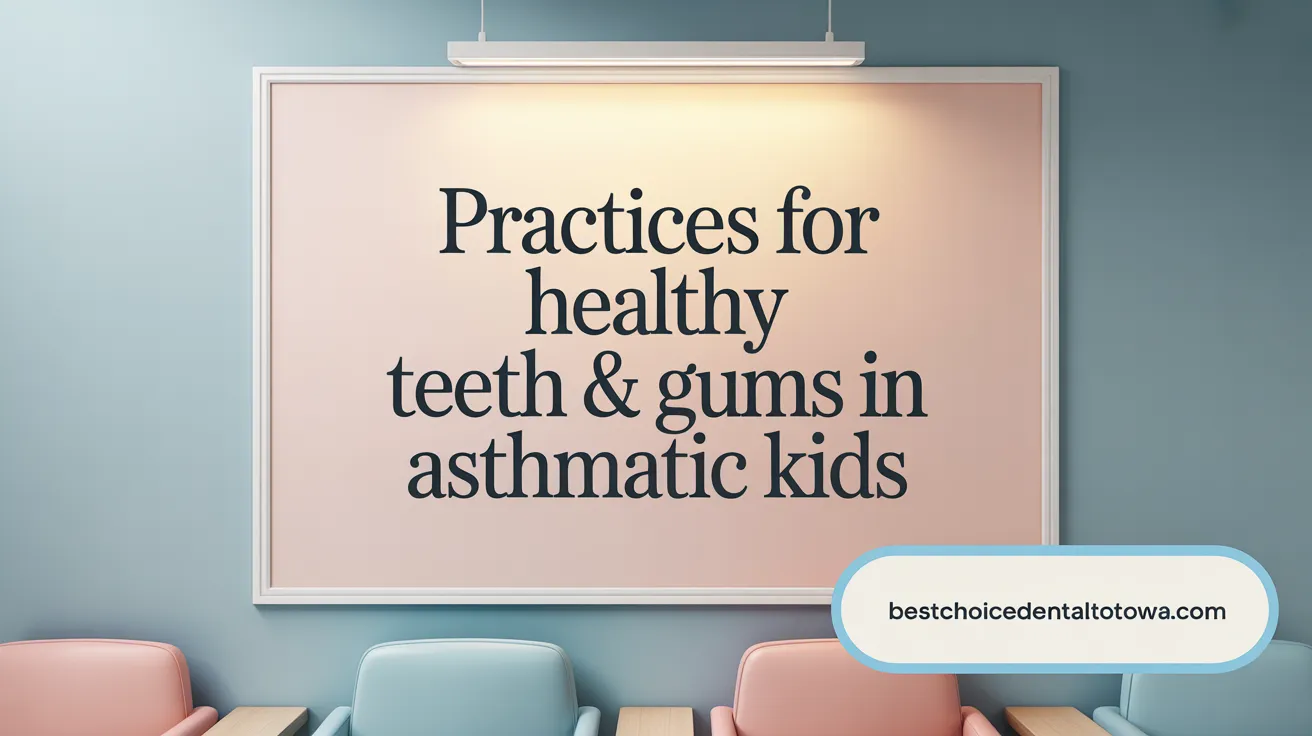
How should children with asthma brush and floss their teeth?
Children with asthma need to maintain diligent oral hygiene to counteract dry mouth and plaque buildup caused by their inhaled medications. It's important that they brush their teeth at least twice a day using fluoride toothpaste approved by the American Dental Association (ADA). Parents should assist and supervise their children with brushing until about age 8 to ensure proper technique and thorough cleaning. Flossing should also be part of the nightly routine to remove plaque between the teeth and reduce cavity risk. For more detailed tips, see Dental hygiene tips for asthmatic children.
Why is rinsing the mouth after inhaler use recommended?
Inhalers used by children with asthma can have acidic ingredients and sometimes contain sugars that promote tooth decay. Rinsing the mouth immediately after using an inhaler helps wash away these residues, minimizing their harmful effects on tooth enamel and reducing the risk of oral thrush or fungal infections. See Rinsing after inhaler use and Rinsing mouth after inhaler use.
How does hydration help oral health in children with asthma?
Maintaining adequate hydration is vital because dry mouth decreases saliva, which naturally protects teeth by neutralizing acids and reducing bacteria. Drinking fluoridated water frequently supports saliva flow and helps keep the mouth moist, directly lowering the risk of cavities for children with asthma. For more information, visit Hydration and Oral Health and Managing dry mouth with asthma.
What kind of toothpaste is best for children with asthma?
Using ADA-approved fluoride toothpaste is essential for strengthening tooth enamel and preventing decay, especially for children whose asthma treatment may reduce saliva protection. The right amount of toothpaste for the child’s age should be used, and parents are encouraged to educate children on its proper use. Learn more about Using fluoride toothpaste for children with asthma and Proper fluoride toothpaste amounts by age.
What dental services does Best Choice Dental offer for families?
Best Choice Dental provides comprehensive preventive dental care tailored to children with asthma. Their services include routine dental check-ups, fluoride treatments, and sealants to help maintain optimal oral health. The practice also focuses on patient education, promoting effective oral hygiene habits such as supervised brushing techniques and recommending rinsing the mouth after inhaler use to reduce medication-related oral health risks. They also consider Special dental considerations for severe asthma and ensure Medical clearance before dental treatment for asthmatic children.
Safe and Compassionate Dental Visits for Children with Asthma
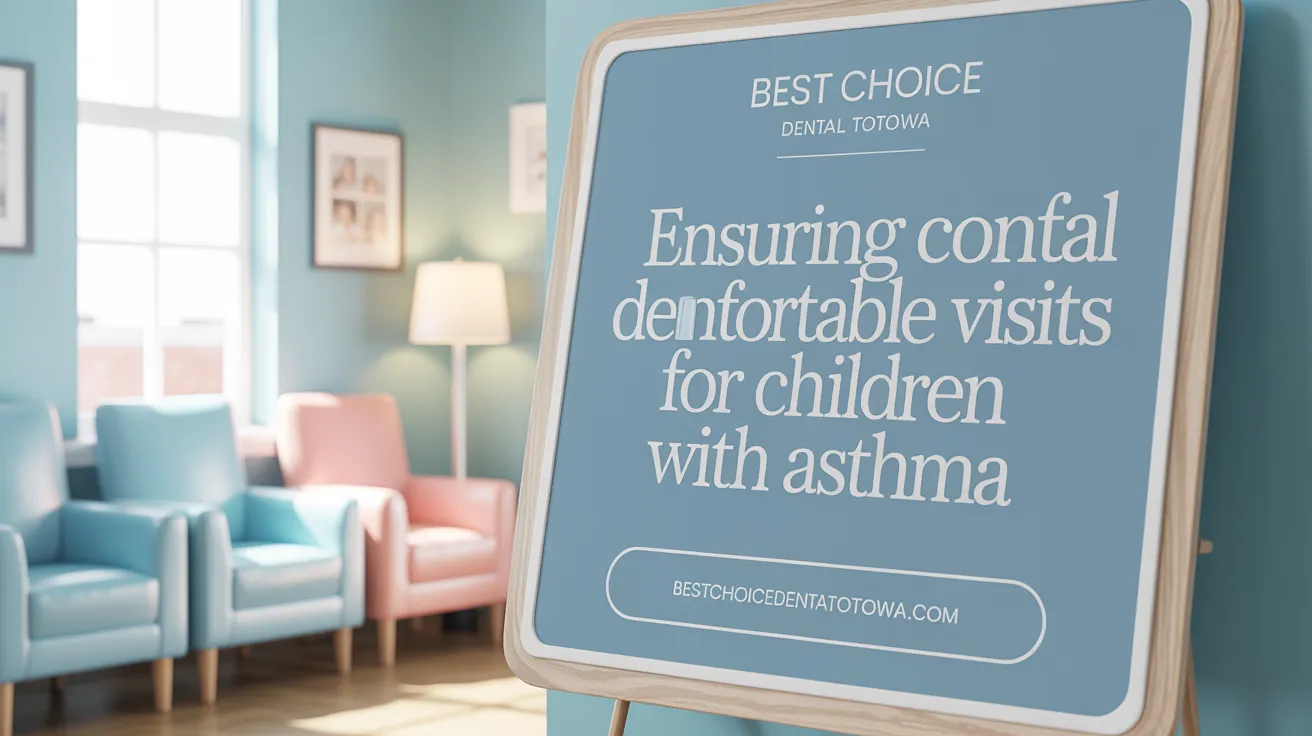
How does Best Choice Dental manage asthma-related risks during visits?
Best Choice Dental embraces a family-focused approach, welcoming patients of all ages, including children with asthma. Their method involves thorough review of medical histories to understand individual asthma conditions and triggers. This ensures tailored dental care that minimizes risks.
What pre-visit asthma condition management is recommended?
Children with severe or uncontrolled asthma may need to stabilize their condition before dental procedures. Ensuring the child has taken their prescribed asthma medication and is well-rested helps prevent asthma attacks during treatments.
Why is bringing inhalers to dental appointments important?
Parents are advised to bring their child's inhaler to every dental visit. Asthma symptoms can be triggered by stress, fear, or exposure to certain dental materials. Having inhalers available allows immediate response to any respiratory difficulty.
How does communication about asthma triggers and medications benefit dental care?
Sharing detailed information about the child's asthma triggers, current medications (including inhaled steroids), and allergy sensitivities allows the dental team to prepare customized care plans. This reduces the chance of triggering asthma attacks or oral health complications.
Are sedation options like nitrous oxide safe for children with asthma?
For children with mild to moderate asthma, nitrous oxide (laughing gas) can be a safe option to ease dental anxiety. However, it requires evaluation, and use is avoided in cases with active wheezing or severe asthma.
What stress reduction techniques does Best Choice Dental use?
Creating a calm, friendly atmosphere helps reduce anxiety that can provoke asthma symptoms. Techniques include gentle communication, allowing frequent breaks, distraction methods, and gradual introduction to dental instruments as described in stress reduction techniques for asthmatic children during dental visits.
By combining careful asthma management, open communication, safe sedation choices, and stress-relief methods, Best Choice Dental ensures children with asthma receive comfortable and effective dental care.
Recognizing and Addressing Oral Health Complications Linked to Asthma
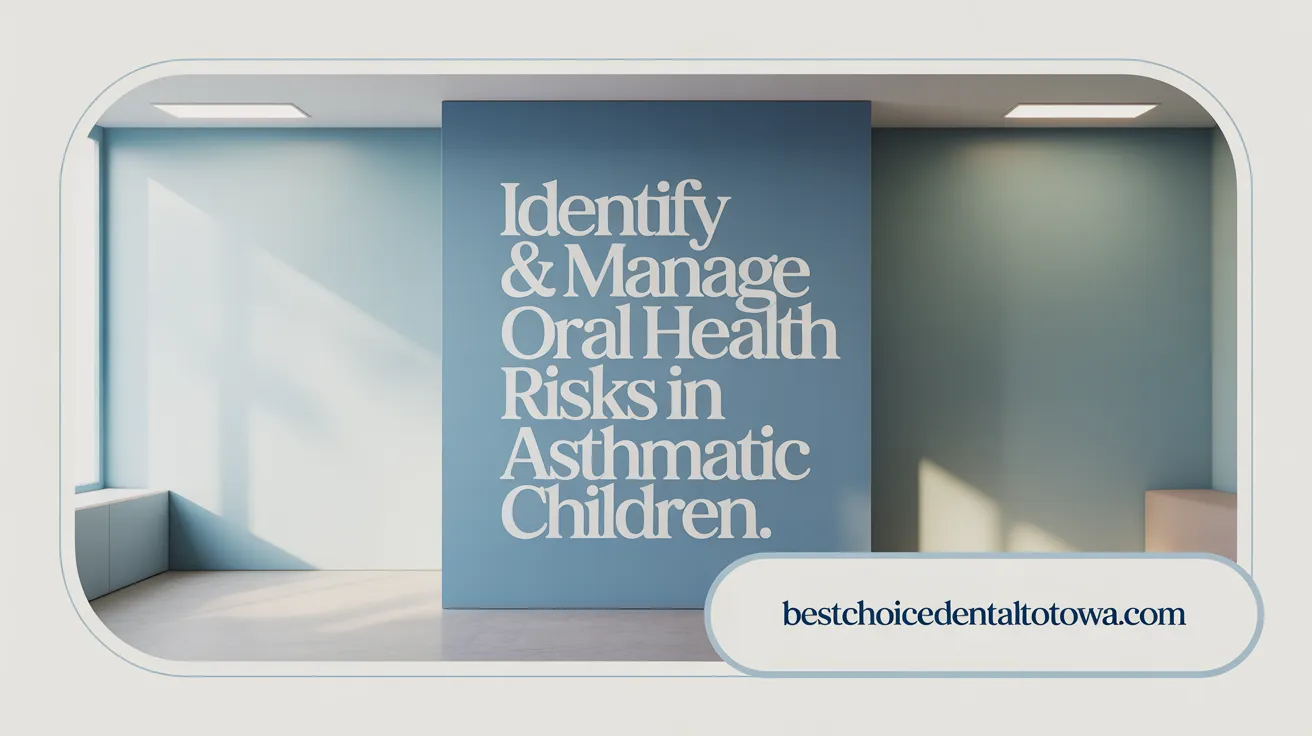
Oral Thrush and Candidiasis Risk from Inhaled Steroids
Children with asthma who use inhaled corticosteroids face a higher risk of developing oral thrush or candidiasis, which manifests as white patches or rashes inside the mouth. This side effect arises due to the steroids reducing the mouth’s natural ability to control fungal growth, making rinsing the mouth after inhaler use an essential preventive step.
Gingivitis and Gum Disease Prevalence in Asthmatic Children
Asthmatic children also experience increased rates of gingivitis and gum disease, likely connected to inflammation and dry mouth caused by asthma medications. Reduced saliva flow limits the mouth's ability to wash away harmful bacteria, leading to plaque buildup and gum tissue irritation. For more information, see Asthma increases gum disease likelihood.
Physical Dental Features Associated with Asthma such as Malocclusion
Beyond soft tissue concerns, asthma may influence dental development. Children with asthma often present with distinctive features such as increased facial height, a high palate, and posterior crossbites. These physical traits can affect bite function and require attentive orthodontic evaluation. Learn more about Facial and dental features associated with childhood asthma.
Importance of Early and Regular Dental Examinations
Early and biannual dental visits are crucial for children with asthma to monitor and manage oral health concerns promptly. These visits allow dental professionals to apply targeted preventive measures and evaluate physical changes related to asthma. See recommendations on Early dental examinations for asthmatic children.
Professional Fluoride Applications and Sealants
Professional fluoride treatments are recommended to strengthen enamel weakened by asthma medications. Additionally, dental sealants can provide a protective barrier against cavities, especially for children at high risk due to dry mouth and medication effects. For guidance, consult Topical fluoride use for children with asthma.
Maintaining close coordination between dentists and asthma healthcare providers ensures children with asthma receive comprehensive care tailored to their unique oral health needs. For more detailed information, visit Dental care for children with asthma.
Collaborating for Comprehensive Care: Integrating Medical and Dental Management
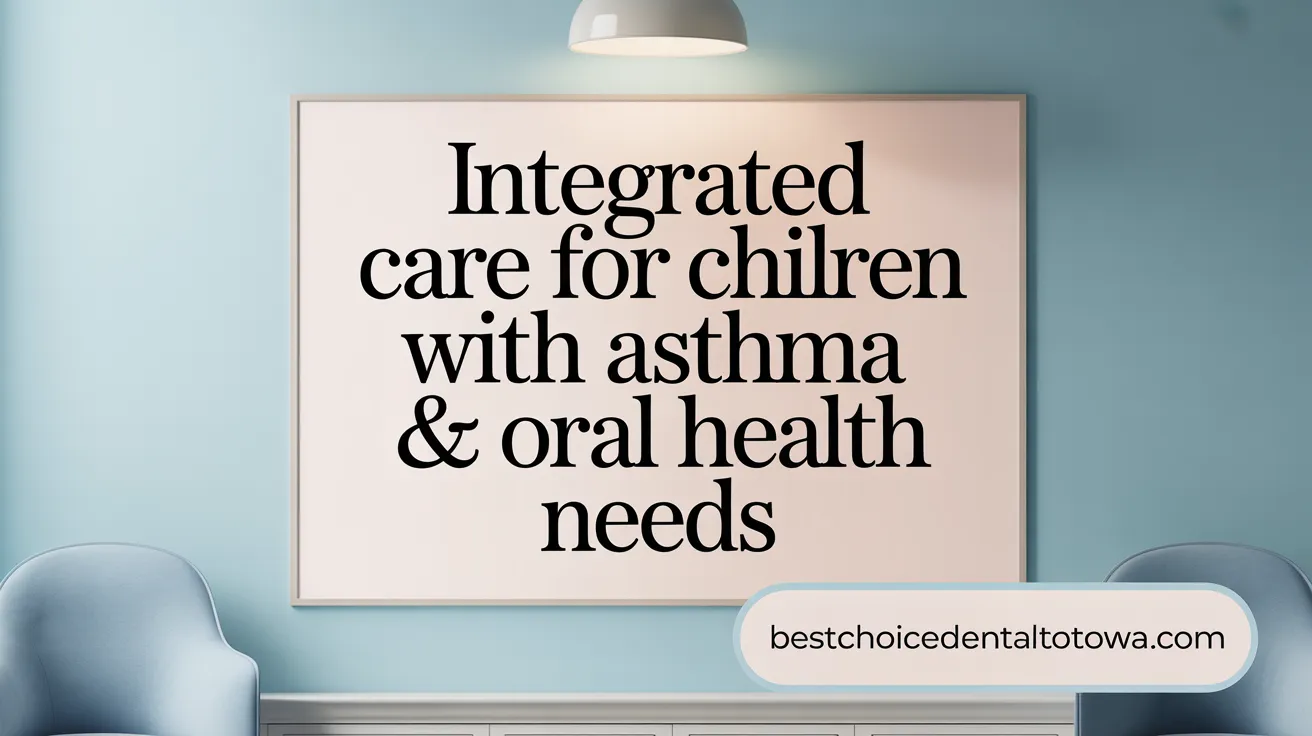
Coordination between dentists and asthma healthcare providers
Effective management of children with asthma requires close collaboration between dental professionals and asthma healthcare providers. Sharing comprehensive medical histories, including details about current asthma control and medications, enables dentists to tailor their preventive and treatment plans appropriately. This partnership helps in minimizing oral health complications related to asthma and its treatment (coordination between dentists and asthma healthcare providers, Dental health in children with asthma, Asthma prevalence and dental care).
Discussion of medications, allergies, and asthma triggers
During dental visits, it is vital for parents to inform dentists about their child's asthma medications, allergies, and known triggers such as pollen, dust, or exercise. Asthma medications like inhaled corticosteroids and bronchodilators can affect oral health by causing dry mouth, increasing cavity risk, or promoting fungal infections like thrush (Asthma medications and oral health, Oral thrush and steroid use. Understanding these factors allows the dental team to prevent adverse reactions and to select suitable treatment modalities (Impact of bronchodilators on children's oral health.
Ensuring asthma control before dental procedures
Ensuring that the child’s asthma is well controlled prior to dental treatments is critical. Children with uncontrolled or severe asthma might require medical clearance before undergoing procedures. Coordination with medical providers helps determine the child's readiness for dental work, reducing the risk of asthma exacerbations triggered by stress, procedure-related anxiety, or exposure to allergens (Medical clearance before dental treatment for asthmatic children, Managing severe asthma before dental treatment).
Emergency preparedness during dental visits
Dental offices should be prepared for potential asthma emergencies by having bronchodilators and emergency equipment readily available. Staff must be trained to recognize asthma symptoms promptly and to administer appropriate interventions swiftly. Inhalers should be available at the appointment, and stress reduction techniques or safe sedation options, such as nitrous oxide with caution, may be used to improve the child’s comfort and safety (Emergency protocols for asthma in dental settings, Safe dental sedation options for children with asthma, stress reduction techniques for asthmatic children during dental visits).
Educating families on managing oral health alongside asthma
Families of children with asthma benefit greatly from education about integrating oral hygiene with asthma management. Advice includes:
- Brushing twice daily with fluoride toothpaste and flossing regularly (Using fluoride toothpaste for asthmatic kids, Dental hygiene tips for asthmatic children
- Rinsing the mouth with water after using inhalers to reduce medication residue (Rinsing mouth after inhaler use, Rinsing after inhaler use)
- Maintaining hydration to combat dry mouth (Hydration and oral health, Hydration tips for asthma sufferers)
- Limiting sugary foods and drinks to decrease cavity risk (Diet and cavity prevention in asthmatic children, Limiting sugar for dental health
- Scheduling dental checkups every six months or more frequently if risk factors exist (Frequency of dental visits for children with asthma, Regular dental visits for asthmatic children
Clear communication empowers parents to support their child’s dental and respiratory health effectively (Communicating asthma management to dentists, Informing dentist about asthma and allergies.
Maintaining Healthy Smiles: Tips for Parents of Children with Asthma
Regular Dental Visits
Children with asthma should see their dentist regularly, ideally every six months, to prevent and manage potential dental issues early. Children at higher risk may need more frequent visits to ensure close monitoring.
Daily Oral Hygiene
Parents should encourage children to brush twice daily using fluoride toothpaste suited for their age and floss nightly. Assistance with brushing is recommended until around age eight to ensure effectiveness.
Diet Monitoring
Limiting sugary and acidic foods and drinks helps protect teeth from decay, especially important for children with asthma who often experience dry mouth from medication.
Open Communication
Parents should inform both dental and medical providers about their child’s asthma, medications, and any triggers. Bringing inhalers to appointments and discussing sedation options with healthcare teams ensures safer dental care.
Proactive Dental Care
Starting dental care early, around the eruption of the first tooth, and maintaining age-appropriate hygiene habits supports healthier smiles despite asthma-related challenges.
